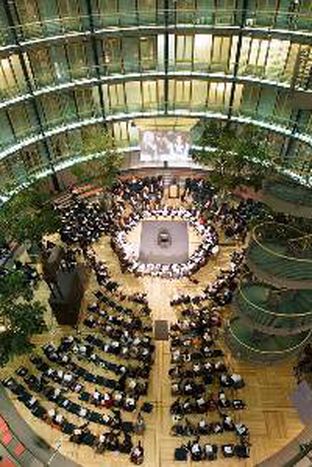
Not a living soul: culture in Europe
Published on
Translation by:
 ed saunders
ed saunders
A November conference in Berlin entitled ‘Giving Europe a soul’, saw high profile speakers giving talks on Europe’s identity. However, not much was actually said
More than 500 participants, a star-studded offering of EU commissioners, high profile politicians and cultural leaders from all over Europe gathered in Berlin from November 17-19, to discuss how to ‘Give Europe a soul’. An intensive exchange of ideas on the uses and power of culture to successfully boost European unification was on the cards.
Perfectly presented
It was a huge goal and an immensely demanding one. The conference was slick; honed to perfection by commercial agencies, it gathered together countless luminaries of European cooperation and unification - Richard von Weizsäcker, Bronislaw Geremek, George Soros and Wim Wenders among others. It was an optimal situation to intensify the dialogue between culture and politics.
José Manuel Barroso, president of the European Commision, emphasised these thoughts as he opened the conference with an emotional and personal speech, beginning by defining values such as freedom, humanism and tolerance as the basis of society. ‘Let us defend freedom, making use of our right to dream of a democratic, tolerant Europe, united in peace,’ he appealed. The strengthening of the cultural dimension of European unification is more relevant now than ever before.
Boost from below
Volker Hassemer, one of the initiators of the conference, stressed that his anxiety is directed towards European culture itself, and not just cultural wellbeing. ‘We don’t become a cultural lobby by saying Europe has to use its cultural powers for its own advancement,’ he emphasized. He and his fellow combatants see themselves as trendsetters. They want to give Europe a boost from below with the help of civil society.
However, despite all these ambitious goals and pleasant declarations, the basic idea of the conference – to allow politics and culture to enter into dialogue – was hardly heeded. In order to have a constructive exchange of ideas, not only optimal conditions are necessary. It is also an elementary requirement not only to deliver sermons on the value of culture, but also to take time to examine critical arguments more closely.
The event’s structure didn’t leave any room for manoeuvre. A typical day included podium discussions, where high ranking politicians, active or retired, could intone their songs of praise to European culture. Meanwhile, other high ranking participants who had travelled from all over Europe were fobbed off with merely a minute of stage time in some cases. To treat people such as Avi Primor – former Israeli ambassador to Germany – in this way is degrading. Less would clearly have been more here.
Of course it is arguably the case that such events offer above all the opportunity to network during (opulent) receptions and coffee breaks. Nevertheless, politicians who have travelled in most cases simply in order to give a speech would rather have been miles away already. As is often the case, MEPs proved to be the positive exceptions to the rule. More than anyone, this means Hans-Gert Pöttering, who is also on the steering committee of the initiative, and the former French culture minister, Jacques Toubon.
Conceptual confusion
As concepts became confused, criticism rightly rose during the conference. When the speakers were talking about ‘Europe’ did they mean the EU? What did they understand by ‘culture’ and ‘European values’? In many statements this ambivalence was evident. Much was said at the conference about the importance of translation, but it would be better to define the terms clearly before having them translated.
It is now the integration of the conference into a political process that will decide the success of the initiative. There is plenty of prominent support, as shown at the Berlin conference. Ideas for putting specific and lasting projects in concrete terms are on the table.
The team behind the conference are happy and glad of a breather. For as Wim Wenders summed it up, in one of the most rousing speeches of the conference: culture is ‘the cement, the glue, the thing which unifies European feeling!’ No-one has fallen in love with an internal market yet.
Translated from Keine Zeit für Europas Seele


